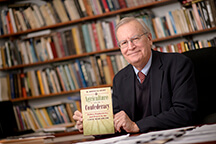Purdue book features 'Agriculture and the Confederacy'
March 2, 2015
 |
|
R. Douglas Hurt, professor and head of Purdue's Department of History, is the author of "Agriculture and the Confederacy: Policy, Productivity, and Power in the Civil War South." (Purdue University photo/Charles Jischke) |
WEST LAFAYETTE, Ind. — Agriculture in the South is the focus of a new Purdue University book that marks the 150th anniversary of the Civil War.
"The South always viewed its agriculture as a form of power, really a pillar of strength that would help win the war. That was a miscalculation," said R. Douglas Hurt, professor and head of Purdue’s Department of History. "Southern farmers thought the war would be short and that Great Britain would enter the conflict to ensure the cotton supply for its textile manufacturers and thereby guarantee Confederate independence."
Agriculture did not sustain the South during the war, and it took crops, such as cotton, sugarcane and rice, years, or even decades, to rebound.
"Agriculture and the Confederacy: Policy, Productivity, and Power in the Civil War South" focuses on the war which took place 1861-1865. The book was published by The University of North Carolina Press as part of its Civil War America series.
"The Confederacy was never able to organize agriculture during the war because southern states were married to state's rights," said Hurt, whose expertise is the history of American agriculture. "Without central government oversight and enforcement, there was a lack of agricultural system and order."
For example, the Confederacy recommended suspending cotton planting for other viable food sources, but there was no mandate or enforcement so farmers did not readily adjust their crops. As a result, the south was short on corn and grain for livestock feed and corn meal as well as human food.
"War also is not good for farmers when soldiers march through fields and destroy crops, livestock, fences and barns," Hurt said. "There also was a reduction in productivity and shipments such as transportation of cattle. Production needs were not met, and the military confiscated food and forage."
Hurt is author of "The Dust Bowl: An Agricultural and Social History," "The Big Empty: The Great Plains in the Twentieth Century," "Problems of Plenty: The American Farmer in the Twentieth Century," "American Agriculture: A Brief History," "American Farms: Exploring Their History," and "The Great Plains during World War II."
Writer: Amy Patterson Neubert, 765-494-9723, apatterson@purdue.edu
Source: R. Douglas Hurt, doughurt@purdue.edu
Related websites:

